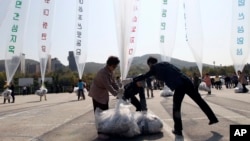Balloons rarely trigger military provocations - unless they are considered a threat. That is precisely how the North Korean regime views propaganda-filled balloons floated across the border from South Korea.
The South Korean Defense Ministry said in a press briefing on Friday that North Korea targeted balloons carrying the anti-Pyongyang leaflets by South Korean activists, leading to gunfire between the two Koreas.
The Defense Ministry said North Korean gunners fired anti-aircraft rounds at the balloons for about 20 minutes, and that some of the shots landed on South Korean soil. After a warning, South Korea responded with 40 rounds from a machine gun.
“The North Korean leaders feel about the defector leaflets a bit like [how] the U.S. authorities feel about the Ebola virus,” Bruce Bennett of the RAND Corporation told VOA by email. “Even a few cases could cause deadly infections that spread out of control.”
The South Korean activists, mostly North Korean defectors who resettled in the South, chose the anniversary of the founding of the North’s ruling Workers’ Party as the launch date, drawing strong protests from Pyongyang.
The leaflets reportedly contained information about the regime’s human rights violations and leader Kim Jong Un’s lavish lifestyle.
The North repeatedly asked the South Korean government to stop the launch, but Seoul denied the demand, saying it cannot legally ban the activity. A recent poll, however, shows there is growing controversy in the South over the practice.
The associate director of the Korea Program at Stanford University, David Straub, told VOA via email that the South Korean government, if possible, should change its laws to permit the state to prevent private citizens from sending physical objects, such as the balloons with leaflets, into North Korea.
“The possible benefits of sending such balloons into the North are far outweighed by giving North Korea a pretext to attack the South,” said Straub, a former State Department official.
Straub views the North’s reaction as a sign of insecurity.
“The regime's reaction is a symptom of a fundamental weakness, which its leaders themselves recognize, at least subconsciously,” he said.
Bruce Klingner, a senior research fellow for Northeast Asia at the Heritage Foundation, told VOA that North Korea has always been very sensitive about the defamation of its leadership.
The communist country, however, “has no problem insulting South Korean and American leadership in an often vile and racist manner,” added Klingner.
Friday’s gunfire has raised doubts about the prospect of progress in inter-Korean relations, which seemed to emerge from a surprise and rare visit by a high-ranking North Korean delegation to the South last week Saturday. The delegation, led by the North’s No. 2 man, Hwang Pyong So, agreed to resume high-level dialogue, which has been stalled since February.
“The incident demonstrates how fragile the recent opening between North and South really is and how it might quickly evaporate unless both sides manage it carefully. That of course has happened before and could easily happen again,” said Joel Wit, a visiting fellow with the U.S.-Korea Institute at The John Hopkins University, in an e-mail message sent to VOA.
The United States has called on the North to refrain from taking provocative actions.
A State Department spokesperson said, “We are monitoring the situation in close coordination with our ROK [South Korea] allies. We continue to urge North Korea to reduce tensions and cease any actions that could increase the risk of conflict.”






